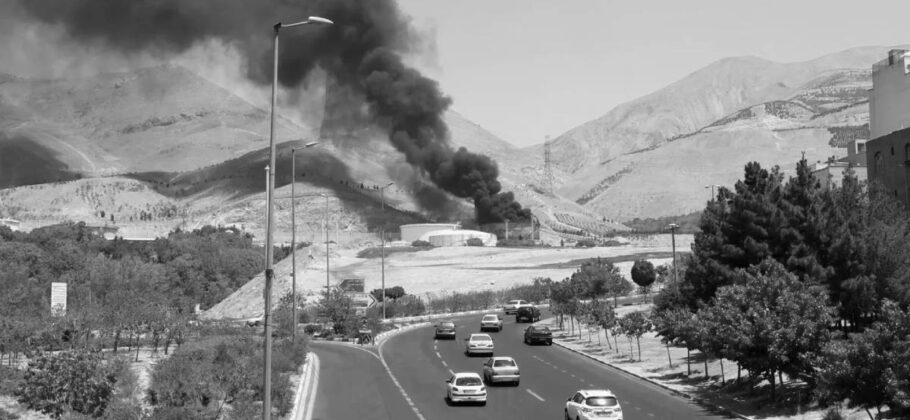In recent days, the escalating conflict between Israel and Iran has sent shockwaves through global energy markets, prompting warnings from top oil executives about potential disruptions to the world’s oil supply. The situation, described as the most significant geopolitical event since Russia’s invasion of Ukraine in 2022, has heightened fears of instability in a region critical to global energy production.
A Rapidly Escalating Conflict
The conflict intensified when Israel launched a surprise attack on Iran’s military and nuclear infrastructure on Friday, June 13, 2025. Iran retaliated with missile strikes on Israeli cities, including a guided missile attack on an Israeli military intelligence center in Tel Aviv. Over the past five days, both nations have traded strikes, resulting in significant casualties—224 deaths in Iran and 24 in Israel, including civilians. The destruction has also impacted key facilities, such as Iran’s Shahran oil depot and Israel’s Weizmann Institute of Science, where years of scientific research were lost.
While major oil and gas infrastructure has so far been spared, the potential for disruption looms large. The Strait of Hormuz, a narrow waterway through which a significant portion of the world’s oil passes, is a particular concern. If Iran were to block this critical chokepoint, it could severely disrupt global oil supplies, causing prices to spike dramatically.
Oil Prices Surge Amid Uncertainty
The escalating tensions have already driven oil prices higher. On Tuesday, June 17, 2025, Brent crude futures rose 3% to $75.41 per barrel, while U.S. West Texas Intermediate futures climbed 2.7% to $73.74. Last week, oil prices surged by 13%, marking the largest one-week increase since October 2022. Gasoline prices in the U.S. have also risen, with the national average climbing three cents to $3.17 per gallon, according to AAA. Some states, like Delaware and Indiana, have seen even sharper increases.
Oil traders are on edge, fearing that further attacks on energy infrastructure could exacerbate the situation. The Middle East accounts for roughly half of the world’s oil reserves, making any disruption in the region a global concern. A recent oil tanker collision near the Strait of Hormuz, though not directly related to the conflict, has heightened worries about the region’s maritime security.
Industry Leaders Sound the Alarm
Top executives from major oil companies, including Shell, TotalEnergies, and EnQuest, have expressed deep concern about the conflict’s implications. Shell CEO Wael Sawan, speaking at the Energy Asia conference in Kuala Lumpur, Malaysia, described the past 96 hours as “very concerning” for the global energy system. He highlighted the uncertainty and geopolitical volatility affecting Shell’s operations in the Middle East, where the company has a significant presence.
The potential for supply disruptions is a key worry. While no major oil facilities have been hit, the risk of escalation remains high. Sawan emphasized the need to carefully navigate the coming weeks, as the situation could have far-reaching consequences for global energy markets.
Global Reactions and Diplomatic Efforts
The conflict has drawn international attention, with world leaders urging de-escalation. U.S. President Donald Trump, who left the G7 summit early, denied working on a ceasefire, instead hinting at a “much bigger” plan to address the conflict. He disputed his Director of National Intelligence Tulsi Gabbard’s assessment that Iran is not actively pursuing a nuclear weapon, claiming Iran is “very close” to achieving one. Meanwhile, Israeli Prime Minister Benjamin Netanyahu stated that Israel’s strikes have significantly set back Iran’s nuclear program, though the extent of the damage remains unclear.
The G7 leaders condemned Iran as the “principal source of regional instability” and called for peace in the Middle East. However, UK Prime Minister Keir Starmer noted there is no indication that Trump plans to deepen U.S. involvement in the conflict, despite Israel’s push for American support in dismantling Iran’s nuclear facilities.
A Fragile Future for Energy Markets
The Israel-Iran conflict has placed global energy markets on high alert. With oil prices already climbing and the threat of further disruptions looming, the world is watching closely. The potential closure of the Strait of Hormuz or attacks on critical energy infrastructure could have devastating effects on global oil supplies and prices, impacting economies and consumers worldwide.
As the conflict continues, the energy industry braces for uncertainty. For now, oil and gas flows remain intact, but the situation remains volatile. The coming days and weeks will be critical in determining whether the world faces a full-blown energy crisis or a return to stability.











